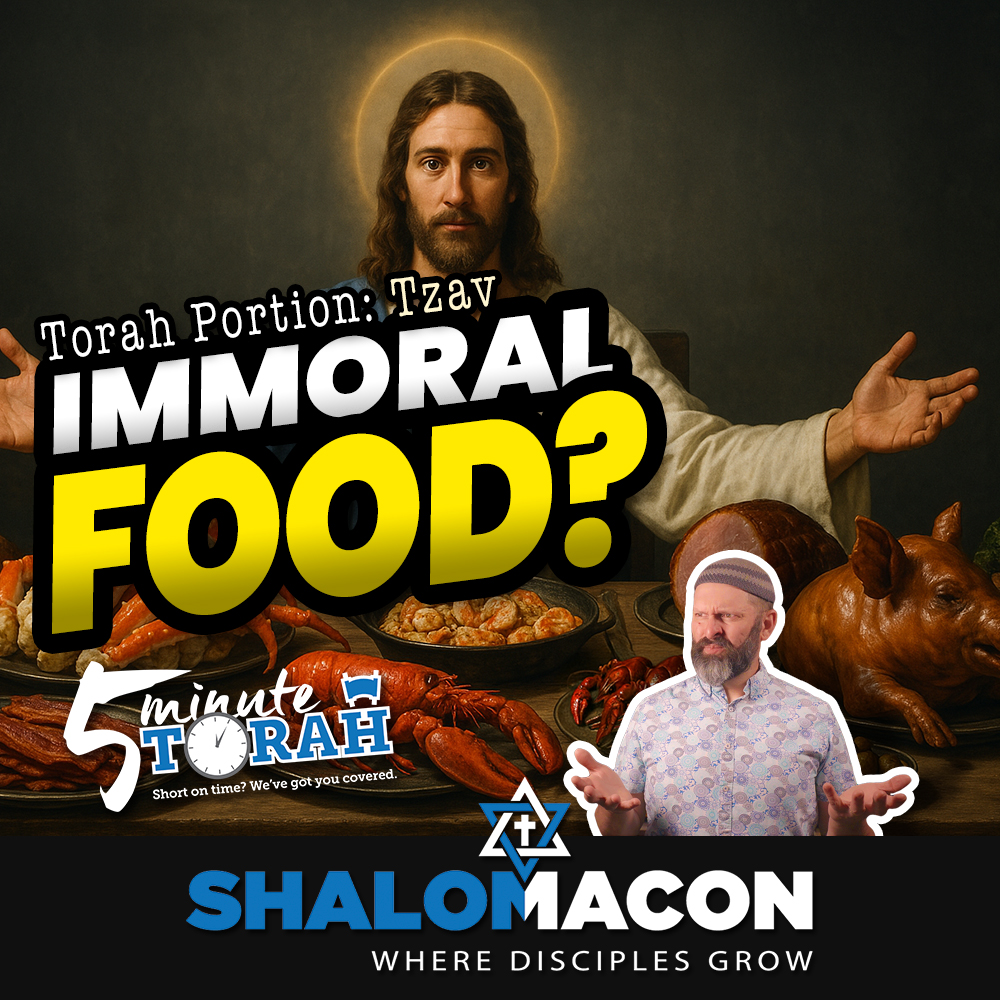Episode Transcript
[00:00:00] Speaker A: I have a confession to make. I'm somewhat of a Trekkie, and there are some aspects of that futuristic imagining that I think are pretty cool. Like the transporters. Think about it. What if you could just step onto a platform and be instantly transported to a new location? You could just say, beam me up, Scotty.
Whoa.
What just happened?
Whoa. That was weird. Well, even though Star Trek transporters are just science fiction, there actually is a connection between space age transporters and this week's Torah portion. Want to know more? Then stick around for this week's 5 Minute Torah.
Shalom and blessings from Shalom Macon, the place where disciples of Yeshua learn, connect and grow. I'm Darren, and before we get into the five minutes of my five minute Torah commentary, let's cover a few quick facts about this week's Torah portion. This week we are beginning a new book of the Torah. We are studying the first portion in the Book of Leviticus, the portion of Vayikra, Leviticus 1, 1:5, 26. And here are the three things that you need to know about it. Number one. Entering the Mishkan, the transition from Exodus to Leviticus. Last week we concluded the Book of Exodus with the Mishkan being erected in the Kavod La do not the glory of the Lord filling it to the extent that no one, not even Moses, could enter. Thus, the Book of Exodus closes and we are left with a cliffhanger. What now? How were the children of Israel supposed to enter the Tabernacle and perform its service? Most people who have studied the Bible for any length of time seem to miss this little problem. But it was real, and the children of Israel needed a solution. Fortunately, the Book of Leviticus picks up where Exodus left off by explaining the procedure for which God may be approached in his holy house. It may seem like our entire Torah portion is simply focused on the detailed laws of various sacrifices that were supposed to be brought to the Mishkan. However, if we take a deeper look, we can see that these details are what allowed the children of Israel to engage with the God who had redeemed them in a tangible manner. Each of the types of offerings created a level of intimacy between either God and the nation or God and the individual. With the result being that an entire nation had a connection to their God. Purity and holiness. Hearing the Heart of God to the average Bible student, there is no more gruelingly painful book of the Bible to study than the Book of Leviticus. Yet according to tradition, Jewish children start their biblical training here with the Book of Leviticus. Why Here the midrash says, let the pure ones come and study the laws of purity. Leviticus Rabba 7:3 in our modern culture, the subject matter of Leviticus is foreign and even taboo, but in the biblical culture, this wasn't the case. Unfortunately, we have distanced ourselves from the things that the Bible places value on and created our own value system that doesn't know how to distinguish between pure and impure, holy and common. Maybe if we taught our children from Leviticus as they were growing up, they would have a better understanding of God's values than you or I did. They wouldn't think it was something so foreign or weird, and it would almost be like we were hearing the heart of God and Number three Salt of the Covenant Transforming Homes into Temples this week's tour portion includes an odd requirement for all grain offerings that were brought to the tabernacle or the temple. Each of them was to be brought with salt. Since the temple is currently not functional, our sages created a tradition to remind us of this fact. Each Jewish home should have salt along with any bread served at the table. Not only this, but they have encouraged families to create an environment in their homes that is represent of the holy temple. Each home should be like a miniature temple and each table is to be seen as if it were an altar. This is especially true on Friday nights as we gather around the table to enter into the Shabbat together. Two special loaves of bread, called challot or challah singular, are prepared for the Sabbath. After the blessing is given for the challah, which is also the blessing for the meal, the bread is divided and each person dips their piece of bread into the salt three times before eating it. Why this tradition? As we were raising our children, we taught them about this tradition and the scripture associated with it. Each Friday night, my oldest son would recite Leviticus 2:13 to remind us why we salted our bread. You shall season all your grain offerings with salt. You shall not let the salt of the covenant with your God be missing from your grain offering. With all your offerings, you shall offer salt. We dip our bread into the salt three times to represent the three times the word melech, the Hebrew word for salt, appears in the verse. If this tradition is meaningful to you, consider incorporating it into your Friday night routine as well.
[00:04:54] Speaker B: Are you ready to take your Passover Seder to the next level? Do you want to have a meaningful connection to Yeshua during Passover? Then grab a copy of cup of Redemption, my Messianic Passover Haggadah, and crank it up a notch. It not only walks you through the traditional seder, but it also connects Yeshua's last meal and his suffering with the various elements of the Seder. It's great for homes and messianic synagogues as well as churches, and gives step by step instructions for conducting your own Seder. It also includes an appendix with articles that answer many questions and objections people might have about a traditional seder, like why do we have an egg on the seder plate? And what's considered leavening? And is price low enough to snag a copy for everyone at your seder table? Just use the link in the description box below to gear up early so you can be ready to make this.
[00:05:32] Speaker A: Passover your best Passover this week's Tor commentary is called Beam Me Up Scotty and comes from my book 5 Minute Torah Volume 3 Parashat D Vayikra is the first reading in the Book of Leviticus. It's a natural continuation of what we concluded in the Book of Shemot or Exodus. The Mishkan, or tabernacle, has just been completed and is now open for business. Thus, the Book of Leviticus begins by spelling out all of the operational procedures for the tabernacle, describing what kinds of offerings may be brought, the parameters for these offerings, and how they are to be offered. Within these descriptions are various kinds of offerings, all of which require the blood of animals, except for a handful of offerings from the produce of the field. When most people think of the sacrificial system, they immediately see the sole function of these animals as a means of dealing with sin. However, as we learn about these offerings, the topic of sin doesn't come into the picture until much later in the list of various sacrifices described in the Book of Leviticus. The olah, or the whole burnt offering, is the very first first on the list. It is typically described as a whole burnt offering because it is entirely burnt up. When any one of you brings an offering to the Lord, you shall offer your offering of livestock from the herd or from the flock. If his offering is a burnt offering from the herd, he shall offer a male without blemish. He shall bring it to the entrance of the tent of meeting that he may be accepted before the Lord, and the priest shall burn all of it on the altar as a burnt offering, a food offering with a pleasing aroma to the Lord. Leviticus 1:2 3:9 as we can see by the very first of these instructions, the primary function of the offerings is simply to draw near to God. As a matter of fact, the Hebrew word For offering is korban, which is from the root karav, which means to draw near. But some may object that these sacrifices are indeed associated with sin, especially since atonement is explicitly mentioned in the instructions for the Ollah. It says, he shall lay his hand on the head of the burnt offering, and it shall be accepted for him to make atonement for him. Leviticus 1:4. The problem with this is that atonement, from the Hebrew word kaphar, was made not only for people, but also for objects within the Tabernacle. See Exodus 20:37 and chapter 30, verse 10. Does this mean that objects had sinned? No, it simply means that they needed some kind of covering. Kaphar simply means covering in order to enter into the presence of the Almighty. Does this mean that the blood of the animals was a protection against the wrath of God, as many teach? Actually, the concept of sacrifices being offered to appease God's wrath is completely foreign to the Bible. Outside of one passage that has been completely misunderstood since, therefore we have now been justified by his blood, much more shall we be saved by him from the wrath of God. This is Romans 5:9. In the context, Paul is simply stating that the death of the Jewish Messiah was not only able to deliver his own people from their sins, but also former pagans. The very next verse also tells us that his resurrection brought us salvation. For if, while we were enemies, we were reconciled to God by the death of his son, how much more, now that we are reconciled, shall we be saved by his life? This is Romans 5:10. Returning to our topic, we have an unresolved issue. If the death of these animals wasn't for sin, and it wasn't to appease God's wrath, then what did it accomplish? First, we need to understand that the point of the sacrifices was not the death of the animal. That's right. Killing an innocent animal doesn't do anything on my behalf. Unfortunately, however, the death of the animal is a byproduct of the true reason these animals were slaughtered in the Tabernacle and in the Temple. The Torah spells out the purpose of ritual slaughter a little later in Leviticus. It says, for the life of the flesh is in the blood, and I have given it for you on the altar to make atonement for your souls. For it is the blood that makes atonement by the life. Leviticus 17:11. The entire reason animals had to be slaughtered wasn't for death, but for life. Before the animal was slain, the petitioner had to place his hands on its head and invest it with his identity. Once the animal was slaughtered, the blood, the life of the animal was splashed against the sides of the altar. As I have previously discussed in my book 5 Minute Torah, Volume 1, in the portion of Achrei Mot, the tabernacle functioned as a type of bridge or gateway that linked heaven and earth. The altar can be seen as the portal that leads from one dimension to the other. As the blood of the sacrifice was splashed on the altar, it was as if the soul of the petitioner had walked straight into into the presence of the Holy One of Israel. It brought him into oneness with his God. From this perspective, the blood of bulls and goats, which were never able to take away sin anyway, According to Hebrews 10:4 was the link between man and God giving the petitioner an opportunity to do something only the Cohen Gadol, the High Priest, was able to do when he entered the holy of Holies one day a year. It was an opportunity for for the average person to say beam me up Scotty and enter immediately into the presence of the Divine King of the Universe. Were sacrifices legalistic? No. They were an opportunity for the average person to enter God's manifest presence, just like the High Priest. Maybe the next time we study the sacrificial system, we should be thinking about the incredible gift of God gave to humans and feel a sense of remorse that this system was taken from us nearly 2,000 years ago. If you want to keep learning, then you need to check out our series A Better Yeshua and the Sacrificial System. It will help answer all of those difficult questions about how Yeshua relates to the Temple, the Aaronic Priesthood and the sacrificial system. Just click on the link right here to get started.



